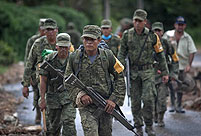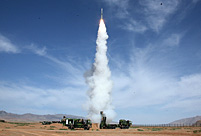BRUSSELS, Sept. 25 -- The Flemish region in northern Belgium aims to establish close ties with the western part of China and build itself into one of the top five regions in Europe by 2020, minister-president of Flanders Kris Peeters said in an exclusive interview with Xinhua this week.
Earlier in September, the head of Flanders led a delegation to Beijing, Chongqing and Chengdu on a mission to seek down-to-earth cooperation in political, economic and academic fields. Over 30 Flemish entrepreneurs went for potential partners and 20 Flemish university representatives signed memorandums of understanding with their Chinese counterparts.
"We have met with a lot of important political leaders in China, and every time it was very fruitful ... They (Chinese officials) were open about China's policies for the next few years and the opportunities that can be seized by Flanders," Peeters told Xinhua, referring to his meetings with Chinese Vice Premier Liu Yandong, environment minister Zhou Shengxian and Chongqing mayor Huang Qifan during his first visit to west China.
In the eyes of Peeters, western China is a fast-growing, dynamic region with a huge market and business opportunities for Flanders, particularly concerning cooperation in construction, environment preservation, life sciences and automobiles, among others.
"A trip for three days was too short. I must come back to west China and see what we can do concretely," he said, expressing his keen interest in engaging with China's "Go West" policy.
Compared to the southern French-speaking Wallonia region, the Dutch-speaking Flanders has been one of the most developed regions on the continent, whose per capita GDP is far above the average level in the European Union.
According to Peeters, Flanders is looking for new markets since the European market has been slowing down. He said the Chinese market can be important not only for large companies but also for small and medium-sized companies (SMEs) in Flanders.
He added that Flanders' latest "new industrial policy" would need crucial partners from China and elsewhere. The initiative aims at stimulating innovation and boosting hi-tech industries.
"I hope that nano and bio technologies will soon be the new elements of cooperation following chocolates and beers," Peeters said.
In response to the Flanders-Wallonia spat over two giant pandas from China, Peeters said instead that the two regions were working well together in spite of long-term divide. He had earlier demanded an explanation from Belgian Prime Minister Elio Di Rupo in the midst of worldwide media attention.
"It is a great sign of friendship and cooperation between China and Belgium, which is the most important (message). And I hope a lot of Belgian people will come to see the pandas in the future," Peeters said.
During Di Rupo's visit to Beijing earlier this month, China offered to loan two giant pandas for 15 years to Belgium. Flanders was angered at the decision of the French-speaking prime minister to send the pandas to a zoo in Wallonia, followed by Di Rupo's insistence on the "professionalism" of the chosen zoo's application.
Belgium has long been split between the two regions over political, economic and cultural differences, with a minority of the Flemish even calling for independence. Economically, Wallonia was once the engine, but for recent decades, Flanders has become wealthier with export-minded manufacturing and service industries.
"I am not in favor of the independence of Flanders. I am in favor of finding a solution... It is a wrong perception that there is no cooperation between Flanders and Wallonia," Peeters said, adding that better economic performance in Wallonia would help benefit both regions.
With a population of over six million people, Flanders contributes to 70 percent of Belgian GDP as well as 80 percent of total exports, while its unemployment rate stands only half of that in Wallonia.
The region has been affected by the global financial crisis and the eurozone debt crisis to a rather limited extent, and the Flemish government has managed to maintain a balanced budget for the fourth consecutive year and created 48,000 jobs for the past four years.
"You need a good government, a lot of good companies and also very hard-working people... It's not easy to remain as one of the very few regions with balanced budget," Peeters said.
Recovering from the crisis, the Belgian economy is expected to grow by 1.1 percent next year, while Flanders has a "simple but ambitious" plan to be one of the five best-performing regions in Europe by 2020, according to Peeters.
"We are already in the top five in certain sectors like education, but the goal is to be in the top five for more than a hundred indicators within seven years," he said.
 Storms leave 97 dead, 58 missing in Mexico
Storms leave 97 dead, 58 missing in Mexico New model of indigenous surface-to-air missiles testfired
New model of indigenous surface-to-air missiles testfired  118.28-carat diamond to be auctioned in HK
118.28-carat diamond to be auctioned in HK Maternal love under streetlight
Maternal love under streetlight Naked foreign student sits in the middle of a road in Haikou
Naked foreign student sits in the middle of a road in Haikou  Colorful Yunnan: Enjoy the natural beauty
Colorful Yunnan: Enjoy the natural beauty Harbin named Chinese city with most beautiful women
Harbin named Chinese city with most beautiful women New college students' military training in Guangzhou
New college students' military training in Guangzhou Rugby girls
Rugby girls PLA's 38th Group Army conduct training
PLA's 38th Group Army conduct training Residences of the royal house of Savoy
Residences of the royal house of Savoy The last days of Wan Aihua
The last days of Wan Aihua Highlights at 12th National Games of China
Highlights at 12th National Games of China Beijing Film Academy welcomes freshmen
Beijing Film Academy welcomes freshmen Large mahjong party sets new world record
Large mahjong party sets new world recordDay|Week|Month